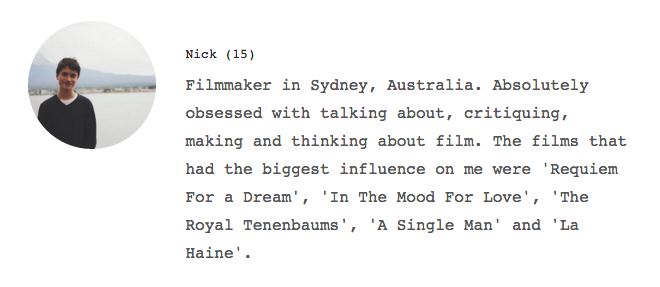It’s Only the End of the World (2016) – Dir. Xavier Dolan
Young French-Canadian auteur, Xavier Dolan has been making films since the age of 19. After his first feature, I Killed My Mother (2009), debuted at Cannes that year, he received the Director’s Fortnight, Regard Jeunes and C.I.C.A.E. awards. Ever since, he has gone onto win the Cannes Jury Prize with Mommy (2014) and also Australia’s Sydney Film Festival with Heartbeats (2010).
It’s Only the End of the World premiered in the prestigious festival’s main competition this year, taking home the Grand Prix, and the Ecumenical Jury award. All of his films are gorgeously shot and directed, with bold, saturated colours flooding the costumes and production design – this film is certainly no exception.
I was lucky enough to watch this film at last year’s Sydney Film Festival, just a few weeks after it premiered at Cannes.
The film, based on the acclaimed play by Jean-Luc Lagarce, follows the introverted Louis (Gaspard Ulliel), as he returns home for dinner after disappearing from his family for twelve years, with no connection or forontact. After discovering that he is dying, he wants to announce his death to his family over dinner. As he arrives at the front door, we can see why he would hesitate coming home. The hallways flood with screaming and shouting, as Louis’ brother, Antoine (Vincent Cassel), his sister (Léa Seydoux) and his mother (Nathalie Baye), argue over nothing in particular. During the course of the evening, as Louis speaks with each member of his family, he is given glimpses into each of their pains, aches and hopes; until they clam up again. Even in a house of the people he grew up with, he has never felt so alone.
Family is the main theme of It’s Only the End of the World, and the complete discord between people. The household is essentially made up of strangers, who don’t have much to do with each other but quarrel. This is a powerful, raw representation of “family”, that has rarely been fully realised on film, until now.
Dolan further demonstrates his masterful visual storytelling and composition, pumping the film with dark, gloomy greens and hopeful, saturated yellows. André Turpin’s gorgeous cinematography focuses very closely on each character’s face, and slowly becomes more and more claustrophobic, as the film goes on.
Xavier Dolan is a fantastic writer and director of actors and dialogue. Each dialogue scene feels almost documentarian, due to the subtle and realistic performances and writing. With Dolan’s familiar use of an upbeat, nostalgic soundtrack, he reuses hit songs from the early- 2000s and gives them a melancholic, gloomy tone, given their context in the story.
In the past, Xavier Dolan has been criticised for being a very indulgent filmmaker, and for “style over substance”. With his last few films, his direction style has matured, and he has found a perfect mix of campy surrealism and neo-realism. I can safely say that this is his darkest, and most mature film yet. It’s not my favourite of his work (that would go to Mommy or Tom at the Farm), it’s still a hugely satisfying watch, and possibly up there in the best of the Alliance Française French Film Festival line-up.
Written by Nick Ward, Sydney.
It’s Only the End of the World
Alliance Française French Film Festival

